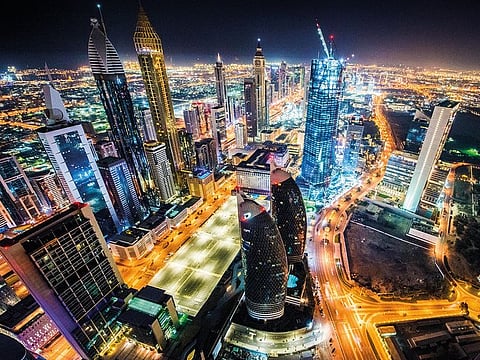Giving shape to UAE’s 2071 economy
Less direct competition with private sector and selective taxes would be a start

What economy do we want for the UAE by 2071?
That year will mark the UAE’s centennial since its establishment, a milestone at which the UAE should gear up for a more globalised — and a more challenging — economic future. Looking at where we are today geographically, and the obvious unlikelihood of being able to relocate the country, revisiting the UAE’s economic fundamentals and recalibrating them into a more dynamic and responsive economy is now more important than ever.
The UAE has come a long way from a pearl diving and an oil extraction economy. Its Gross Domestic Product (GDP) today is 25 times where it was in 1971. Using oil and its revenues to grow other sectors aided the UAE in diversifying the economic base and thus sources of revenue.
Here’s what the UAE has done so far to achieve that.
Trading credentials
First, the UAE established itself as a regional and global trade hub, connecting regions and continents via a vibrant aviation sector and globally competitive national carriers. Not only that, the UAE’s outstanding infrastructure, including but not limited to its ports, has positioned itself as a re-exporter of commodities and manufactured products.
Second, the UAE’s investment into its infrastructure and into its aviation sector placed it at the crossroads of East-West tourism, developing the stopover model, and expanding it in ways that generated growth in other connected sectors, such as entertainment, retail, and real estate.
Third, the real estate sector became an economic behemoth in its own right, putting supply-side economics into practice by developing various areas of the UAE for retail and investment purposes.
Fourth, the UAE also managed to kick-start an entrepreneurial environment that elevated the UAE and its economy into top global ranks in “Ease of Doing Business”, published annually by the World Bank, and in “Global Competitiveness”, published by the World Economic Forum.
Fifth, the UAE’s safe and sound fiscal and monetary policies, being pegged to the US dollar, has made doing business in the country even easier. That is, businesses could better anticipate costs of imports and revenues from exports, enhancing the UAE’s image as a trade hub and a global re-exporter.
Managing resources
The sixth has to do with the planning role that the UAE’s government played in all of the above points, allocating land for development and supporting a business-friendly environment for the private sector, as well as its national companies, that allowed them all to grow and expand. The government role was crucial too in setting priorities and indicating what direction it plans to take with regards to its strategic sectors and economic growth engines.
So, how should the UAE’s economy evolve over the next 50 years in order to stay competitive and grow sustainably?
The UAE’s government role must now change. The government can no longer be a player in the market via its state-owned enterprises (SOEs) if it would like the private sector to grow and to drive economic growth.
Therefore, and while it can retain its planning role, the government’s role must be limited to that and to monitoring and regulating. That is, the government must enact and modify policies if and whenever needed to support the private sector, without being a player in the market.
In a nutshell, the UAE’s economy will need to move towards privatisation.
The UAE will also need to constantly review its fiscal and monetary policies to ensure its economic competitiveness. This includes, for instance, taxes that need to be imposed on oversaturated economic sectors, such as real estate, and the removal of taxes on sectors that haven’t reached that point yet, like tourism.
A relook at dirham’s value
To further support tourism, as well as the attraction of investments through the new foreign ownership law, the UAE may want to re-evaluate the value of its dirham compared to countries in the region. Doing so may require partial control over the UAE’s monetary policies and more flexibility in raising or lowering interest rates based on the UAE’s economic and financial needs.
The UAE will also need to assess its business environment and continue to do so as it seeks to encourage entrepreneurship and the expansion of Small and Medium Businesses (SMEs). To elaborate, the evaluation of viable business ideas should not be based solely on domestic needs and consumption, but on the ability of those SMEs to compete regionally and globally.
A suggestion here would be to review start-up fees, which can be quite high, and reduce them. Fees can be replaced by brackets of corporate taxation that kicks in only when a minimum income has been attained, naturally favouring start-ups and SMEs.
Moreover, the UAE will need to explore the development of new sectors that could become drivers of economic growth by its centennial milestone. Broadly speaking, the UAE will mainly need to explore its position in a regional and global value chain, with the aim to capture more of it eventually rather than continue as a re-exporting hub.
Centralised planning
The UAE should also establish an economic planning council that coordinates local and federal economic policies. Better coordination on economic policies will not only grow the UAE’s economy sustainably into the future but will better distribute economic growth among the seven emirates.
In conclusion, the UAE’s economic story is one of awe and applause. However, and in order for the UAE’s economy to achieve sustainable economic growth, the UAE will need to better coordinate its economic policies, encourage start-ups and SMEs, tax oversaturated economic sectors and relieve others from excessive taxation.
The UAE will also need to identify and support potential sectors that will drive its future economic growth.
The last thought that I want to leave you with: What will be the UAE’s future economic drivers?



